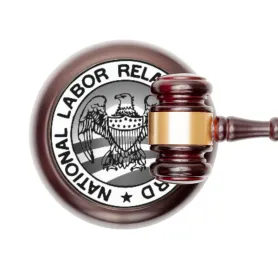On September 15, 2020, the National Labor Relations Board (the “NLRB” or “Board”) Division of Advice (“Advice”), published four Advice Memoranda addressing an array of issues ranging from COVID-19-related unilateral actions to non-work political advocacy and the legality of confidentiality provisions in separation agreements. The Memoranda were drafted by Advice last month, and join the panoply of other recent guidance released by Advice on July 15 and August 13.
Advice Memoranda are only binding on the parties subject to the instant dispute, but they are publicly released to give the public an idea of how the agency might handle similar issues, and thus are instructive to employers, unions and employees considering their rights and obligations under the National Labor Relations Act (the “NLRA” or “Act”).
Unilateral Changes Pursuant to Management-Rights Clause and Effects on Bargaining Obligations in light of COVID-19
In Comcast Cable, Advice considered whether a contractual management-rights clause permitted Comcast to unilaterally require employees engage in “home-garaging”, or the keeping of company trucks in their home garages. The Board analyzed this under the “contract-coverage” doctrine set forth in MV Transportation, 368 NLRB No. 66 (2019). After examining the management-rights clause in the contract—which authorized the employer “to make and enforce new work rules,” including “operational rules and procedures…and safety rules and procedures” as well as other strong language evidencing Comcast’s managerial discretion in its business operations—Advice concluded that Comcast had contractual authority to implement the policy to protect workers.
While Advice acknowledged Comcast had the contractual right to implement the decision regarding home-garaging, Advice also found that the parties reached a bona-fide impasse over the “effects” of the policy, citing the parties’ numerous conversations about the policy between, and where the parties exchanged numerous good-faith proposals regarding the scope and length of the policy. While Comcast refused to establish home-garaging as a permanent feature, it nevertheless sought potential compromises and continued to solicit counteroffers, demonstrating the employer’s proposal was not delivered as fait accompli.
Interestingly, the Region asked Advice whether it should issue Complaint to urge the Board to expand the “exigent economic circumstances” exception of the duty to bargain because Comcast argued the pandemic required it to implement the home-garaging policy for health and safety (but not economic) reasons. Because Comcast bargained to impasse over the “effects” of the home garaging policy, Advice opted not to address the “exigent-economic-circumstances” issue.
Unilateral Implementation of COVID-19 Safety and Benefits Policies
In another COVID-related Advice memo, Mercy Health Partners, the employer, a hospital network, made numerous changes to its policies and benefits without first notifying the Union and providing an opportunity to bargain. The hospital network altered its policies related to the use of personal protective equipment (“PPE”), hospital visitors, COVID-related paid leave and time away from work, delegation of ICU nurse duties to others, travel reimbursement (to encourage social distancing), event reporting processing for COVID-related events, and assignments/safety protocols for immunocompromised or pregnant staff.
Advice concluded that the employer did not violate Sections 8(a)(5), 8(a)(1) or 8(a)(3) of the NLRA because the unilateral changes were (i) legally mandated by state executive orders, or (ii) reasonably related to the COVID-19 emergency. Advice also found that the employer satisfied its obligation to bargain post-implementation by negotiating or communicating its position on each item over which the Union requested to bargain. Further, the parties continued to meet on a weekly basis to negotiate pandemic-related “effects” on the hospital network’s employees.
Additionally, Advice found that the policy changes regarding the use of PPE was not discriminatory or retaliatory because the policy applied even-handedly to unit and non-unit employees alike. Advice agreed with the Region’s recommendation to dismiss the charges.
Non-Work Related Political Activity
In UFCW 1994 MCGEO, an employee who worked as a union representative for a labor organization representing uniformed police officers was discharged “for working on police transparency and accountability legislation . . . in [their] capacity as a state legislator.” The employee’s advocacy for police reform occurred while the employee was acting as a Maryland State delegate and “testifying before a local county council and otherwise.” Advice concluded that the employer did not violate Section 8(a)(1) of the Act when it discharged the employee, as the employee’s advocacy was not at all related to their employment for the employer; nor did that advocacy have any connection to an employment concern of any employee. Rather, the employee “acted in the interest of the community at large and in furtherance of [their] own political agenda” when they advocated for police reform. Given that the Act “does not protect employee political advocacy that has no nexus to a specifically identified employment concern,” Advice recommended that the Region dismiss the unfair labor practice charge related to this activity.
Separation Agreements Prohibiting Workers from Discussing Wages
In Modernize Inc., Advice evaluated the legality of a separation agreement that included language prohibiting the employee from discussing terms and conditions of employment. As background, in July 2019, an employee was discussing compensation with a co-worker, encouraging the co-worker to seek a raise, the employee was told by management numerous times to stop discussing compensation with other employees. The employer ultimately terminated the employee for “continuing to disclose private conversations”, and the parties entered into a separation agreement that included a general release from all legal claims in exchange for three weeks’ pay. The separation agreement contained a confidentiality provision, which required the employee to keep the agreement’s terms confidential, except for consultations with an attorney or family member. It also contained a non-participation provision, which prohibited the employee from voluntarily participating in any judicial or adversarial proceeding relating to his or her employment or termination.
Without addressing whether the employee’s discharge was lawful, Advice concluded that the separation agreement – including its confidentiality and non-participation provisions – was lawful. Citing Shamrock Foods Company, 366 NLRB No. 117 (2018), Advice reasoned that the Board has upheld similar confidentiality provisions as lawful and that when read in its entirety, the non-participation provision was lawful because it did not restrict the employee’s ability to participate in Board investigations or proceedings either individually or on behalf of a co-worker.
Advice also recommended that the Region honor the release of claims contained in the separation agreement, including to the NLRA claims raised against the employer. Applying the four-factor test set forth in Independent Stave Co., 287 NLRB 740 (1987), Advice reasoned that: (i) there was nothing to suggest that the employee did not intend to enter into the separation agreement and, as such, all parties agreed to be bound; (ii) the settlement at issue was reasonable given “serious weaknesses in the Region’s theory of the case,” as the Board has recently questioned precedent holding that employers violate the Act by forbidding workers from discussing wages; (iii) there was no “undue pressure” on the employee to execute the agreement, as the employee was highly compensated, was given ten days to consider the agreement, and was encouraged to consult with an attorney; and (iv) the employer’s potential violations of the Act were not tied to an “unlawful scheme.”





 />i
/>i
